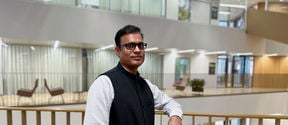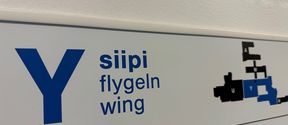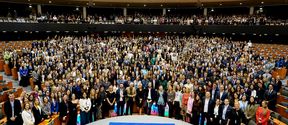Doctor’s career path: Professor of Marketing Joonas Rokka's story
Since 2015, Joonas Rokka has worked as the Associate Professor of Marketing at the EMYLON Business School, which is one of the leading and most illustrious business schools in France. In 2010, he received his Doctor of Science (Economics and Business Administration) degree from the School of Business doctoral programme. In 2011, Rokka started working as the Assistant Professor of marketing at the Rouen Business School (now NEOMA Business School), which is a French top-tier university and the second oldest business school in France.
Joonas Rokka, you graduated with a master’s degree in economics in 2005. Did you apply for the doctoral programme directly after your master's degree studies? Was it obvious for you that you wanted to pursue doctoral studies in business and economics?
At the end of my master’s studies, I was working part-time at Valio, and they had already offered me a full-time job after I graduated. But when I was turning in my master's thesis in December 2005, I was offered the position of assistant at the Department of Marketing. I had made a pretty thorough master's thesis, and they suggested that I could write an academic article on it and think about applying for post-graduate studies. I hadn't considered doctoral studies an option before, and I didn't really know about the nature and requirements of the studies. However, I was extremely interested in the challenge and very eager to learn. I left my job at Valio at once and started working as a department assistant. Sometime later, I was chosen for the doctoral programme in marketing. I haven't regretted the decision even once.
What do you think is best about the doctoral studies at the School of Business? And is there something that needs improving?
Doctoral studies at the School of Business gave me a very strong researcher education as well as a broad expert network, and resources for going for international tasks as professor. One of the best parts of the programme has been getting to know other post-graduate students. I’m glad to say that I still see many of them on a regular basis, and they are very dear to me. Really, you don't have to – nor should you – work on the doctoral programme alone; it works best when you are having fun together. Researchers’ work is creative, and that's why it's very important to feel that your surroundings and the people around you promote a creative and good vibe. At Aalto, this was the case, at least in the Department of Marketing.
An excellent improvement is that the programme has taken great steps toward internationality in the recent years. At the time when I was doing doctoral studies, the major part of researchers and professors was still Finnish.
It is true that the School of Business doctoral programme has become much more international in the past years. During your studies, how much did you take part in seminars and conferences abroad?
Conferences are a significant forum for researchers to develop their own research but also for building new contacts and forms of cooperation and your reputation. The School of Business does well in supporting post-graduate students’ conference trips, even when compared internationally. The most memorable conferences during my post-graduate studies included trips to Boston, Toronto, Pittsburgh, Milan, Sao Paulo and Odense.
Did you conduct studies in foreign universities during your doctoral studies? If so, did you apply for funding from a foundation for this purpose?
Since my goal was to apply as a researcher abroad, I felt that exchange studies would provide a very important experience for my post-graduate studies and CV. In 2008, I did a six-month research exchange at HEC Paris Management School, which is the leading business school in Europe. It was a completely eye-opening experience, and I especially became familiar with the demands regarding quality and standards in a high-level elite institution in the field. I was able to easily fund the exchange period with grants from the HSE Foundation and the Foundation for Economic Education. Arranging the exchange period and finding funding for it was in no way difficult. One significant consequence of the period was the decision to apply for a post as a researcher in France later on.
How long did your doctoral studies take?
I officially started my doctoral studies in autumn 2006, and I defended my dissertation in May 2010. My progress was very good, especially when considering that I was able to fit in a six-month exchange in Paris and that I returned to Valio for a short while in spring 2009 to manage their digital marketing – for a project that was very closely related to the topic of my thesis and my research interests. This unexpected turn was very pleasant, as well. And it also illustrates the demand for School of Business post-graduate students in the corporate world.
Did you find employment after your doctoral studies in the way that you had hoped?
I immediately found a job abroad as assistant professor of marketing – my dream job, you could say. It seemed that, besides my own doctoral dissertation and publications, the good reputation of Aalto University/Helsinki School of Economics played a big role in the recruitment process. Also, when applying to France, HEC Paris Management School was a significant brand to have in my CV.
In his research and teaching, Joonas Rokka focuses on brand, consumer experience and consumer culture, digital media and creative visual research methods. His work has been recognised with numerous awards, such as The Sidney J. Levy Award for best consumer research article based on a doctoral thesis, titled “Timeflow: How Consumption Practices Shape Consumers’ Temporal Experiences”, and he has consistently had articles published in the most prestigious publications in his field, including the Journal of Consumer Research, the Journal of Business Research, the European Journal of Marketing and the Journal of Marketing Management.
Rokka is also known as the pioneer of videographic research methods. Regarding this topic, Rokka is currently editing a special videography issue for the Journal of Marketing Management. In addition to traditional text-based articles, the issue will include something that has likely not been seen before – academic peer-reviewed research videos.
Read more about the School of Business doctoral programme
- Published:
- Updated:
Read more news

Teamwork First-Aid Kit supports students in project-based courses
This online resource offers tools to support student teams throughout project courses.
Summer School Teacher Interview: "Human-centered UX design places people at the forefront of technological advancements."
Learn how to design human-centered solutions in the Human-Centered UX Design course by Aalto University Summer School.
Activities from Maarintalo to move to the Undergraduate Centre
Maarintalo will be closed at the end of May.